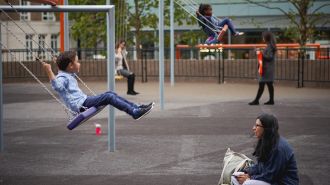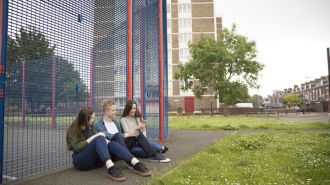- Our studies
- Our research
- Publications and resources
- Data access and training
- About
- News
- Events
- Get in touch
- Join our mailing list
Welcome to our news and blogs section. Here you’ll find the latest developments and insights from across our longitudinal studies.
Growing Up in the 2020s is the country’s first comprehensive long-term study tracking adolescents’ development and educational outcomes following the Covid-19 pandemic.

Teens from ethnic minority backgrounds and deprived neighbourhoods were particularly at risk of being exposed to high levels of air pollution during childhood, with potential long-term impacts on their health.

Data from the 1970 British Cohort Study (BCS70) Age 51 Sweep are now available to download from the UK Data Service.

Increasing access to parks and gardens may not be enough to help teenagers in urban areas get a healthy amount of sleep.

For most young people in England, growing up in the north or south, by the coast or in the city, is less important to their educational progress than their socioeconomic background and whether they come from a deprived neighbourhood.

Researchers from around the world have been using CLS study data to tackle important questions. Here is a round-up of nearly 100 new pieces of research that we’ve added to the CLS bibliography between April and June 2021.

This project aims to examine the experiences of care leavers who became parents (of cohort members) and the intergenerational impact on their children’s outcomes.

Researchers from around the world have been using CLS study data to tackle important questions. Here is a round-up of over 70 new pieces of research that we’ve added to the CLS bibliography between January and March 2021.

Our initial findings from the Millennium Cohort Study Age 17 Sweep cover a range of themes, including mental health, obesity, substance use and antisocial behaviours.

Researchers from around the world have been using CLS study data to tackle important questions. Here is a round-up over 40 new pieces of research that we’ve added to the CLS bibliography between October and December 2020.

Researchers from around the world have been using CLS study data to tackle important questions. Here is a round-up over 100 new pieces of research that we’ve added to the CLS bibliography between April and September 2020.

Children growing up in families with expensive homes have fewer emotional and behavioural problems, finds new research led by the UCL Centre for Longitudinal Studies (CLS) based at the UCL Social Research Institute.

How much does one’s family background influence their midlife wellbeing? And, what effect does technology engagement have on teenage sleep? What is the psychological impact of having to work part-time when full-time jobs are not available? And, how important is cognitive ability in helping people climb the social ladder?
Ryan Bradshaw
Senior Communications Officer
Phone: 020 7612 6516
Email: r.bradshaw@ucl.ac.uk